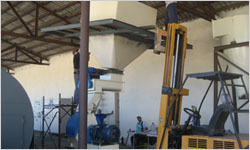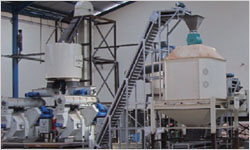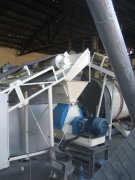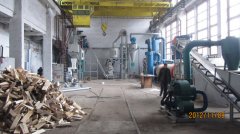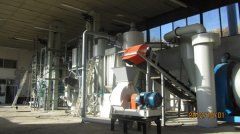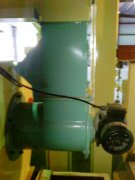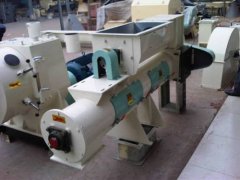Wood pellet boom and harvest for US
The chief science advisor of the United Kingdom energy agency released a report that burning wood biomass for energy will significantly change UK energy policy with significant implications for the rapidly expanding wood pellet industry in the southern United States.
The report was prepared by the independent scientist at the U.K. Department of Environment and Climate Change which exposed what a growing number of scientists and scientific reports have found: burning wood for energy production is "carbon natural" and preferable to rely on coal or natural gas in terms of reducing heat producing carbon in the atmosphere.
Read:How to start a pellet plant
The report use a comprehensive model to calculate the carbon emission associated with the burning of wood pellets, and finds that burning wood pellets may emit four times of carbon as burning the coal.
As of 2015, all power generators in the UK that burn biomass will have to meet sustainability criteria to receive critical subsidies. In response to the carbon report, UK and US science and policy experts are pushing the UK government to follow the report's findings and deny subsidies to generators who cannot demonstrate actual carbon benefits.
Most of the demand for wood pellets in Europe is for energy production in the UK so the report and potential policy change holds particular significance given the proposed expansion of the wood pellet industry in Southeastern states. Enviva has constructed three wood pellet production facilities in northeastern North Carolina and southeastern Virginia and an associated export facility in Chesapeake, Virginia. At its existing pellet mills, Enviva has sourced pellets from natural hardwood forests. It has proposed constructing three more pellet mills in southeastern North Carolina and central South Carolina, and with the State of North Carolina, has proposed constructing a wood pellet export facility at the Wilmington, North Carolina port.
At the heart of the debate is the dramatic growth in new wood pellet production to meet the surging demand from the UK. Drax, the UK's largest utility, has already converted one of its coal-fired boilers to burn wood pellets and plans to convert three more. This increased demand for wood as a fuel source in the UK is driving the expansion of wood pellet manufacturing and export in the US South.
In contrast to other European countries, the United Kingdom planned to rely significantly on burning wood - instead of other alternatives such as solar and wind - to meet a European Union mandated goal of 20 percent of energy production from renewable resources by 2020.
This demand for wood pellets in the United Kingdom has fueled a rapid expansion of the wood pellet industry in the southern United States, which is the major sourcing area for wood biomass for UK utilities. Some of these wood pellet producers have focused on harvesting whole trees, including natural forests and even wetland forests, to meet pellet production needs.
Major European utilities led by Drax, E.On and Electrabel have invested greatly in burning forests for electricity generation rather than pushing toward truly renewable energy generation like wind and solar. Heavily subsidized by the EU and national governments, this report serves as a wake-up call to policy-makers, corporate leaders and major investors in the US and Europe who have implemented biomass as part of their strate.
There are currently 21 pellet mills operating across the region with 29 facilities proposed to come online over the next several years. Included in those proposals are three new wood pellet mills to be operated by Enviva and four new facilities to be operated by Drax and its subsidiaries in Mississippi, Louisiana and South Carolina.
"Without government subsidies in Europe, this wood pellet export industry would not exist. This science report and potential policy change on subsidies is the beginning of the end of sourcing wood pellets from natural forests in the southern United States," said Carter.
While a number of European nations, led by the UK, Netherlands, Denmark and Belgium, have turned to biomass as a means to reduce carbon emissions under EU renewable energy mandates, scientists and conservation organizations have continued to push back against the assumption that because trees simply grow back this industry is carbon beneficial. The findings from the new report not only support ENGO claims but also show that, in many cases, burning wood for electricity has an even more detrimental impact on our climate than burning coal.
The report examines a range of sources of wood biomass, from sawdust residues from sawmills to whole trees from natural forests. The "carbon neutral" assumption arises from the assumption that trees would regrow and consume the carbon put in the atmosphere through burning wood for energy, but the report finds that assumption fails to fully examine that different sources of wood for biomass have dramatically different impacts on carbon in the atmosphere. The new report concludes that many of the potential sources of wood biomass result in more carbon pollution in the atmosphere compared to burning coal or natural gas over 40 and even 100 year time horizons.
China largest energy biomass pellet mill manufacturer
10 years experience focus on biomass energy equipment research
If you need pellet mill, please feel free to contact us. Our professional salesman can give you suggestions to choose the most suitable type.
-----------------------------------------------------------------------------------------------------------------------------------------------
Biomass Pellet Fuel Market Across Portugal
The Portuguese wood pellets market started developing around 2005 and is still in an initial stage; the large majority of the production is exported and the domestic consumption is extremely scarce...
Straw Pellets Machine
The best straw pellets machine manufacturer in China is Kingman. Besides, Kingman pellet press machines have won worldwide praises due to the high efficiency, meticulous design and whole-hearted services.
Homemade wood pellet machine
Wood pellet machine is a kind of equipment to compress the woody waste into pellet without the bonding materials. As the development of biomass energy, requirement for homemade wood pellet machine are increasing day by day.
how to start a wood pellet business
How to start a pellet plant is usually raised by clients or potential clients who possess abundant and sufficient biomass material such as wood blocks, wood sawdust or saw shavings, bark, tree branches and twigs as well as rice husk, wheat straw, cotton stalks, maize stalks, corn cobs, bagasse, palm EFB, bamboo.
News
- Issues that need to concerned during the applying of straw pellet mill
- How to make quality sawdust pellets
- Maintain of Screw Extrusion Pellet Mill
- Renewable resources get more subsides from the UK government
- Wood pellet mill is becoming pioneer of energy-saving and emission-reduction
- fuel per year(project) is being built in Chang Bai County Jilin provinces
- Shandong province has first exported biomass fuel
- Further processing of corn straw pellet
- India is developing biomass energy
- Drax secures forward power sales despite tough market
- How to use wood pellet stoves
- More pellet plant is being built
- Eco-friendly smokeless straw pellet fuel
- Factors which affect the compacting performance of biomass pellet fuel
- Biomass briquetting fuel is facing a good opportunity to make progress
- FAQ of Pellet
- Screw Type Extrusion Pellet Mill
- Compression Ratio of Pellet Mill
- Improving air quality through promotion of biomass stoves - KMEC Pellet Plant
- Effect of pore size of sieve to the production of straw pellet mill
- Wood Pellet Mill For Sale
- Wood Pellet Mill in China
- Wood Pellet Mill Machine
- The Southeast Asia pellet market is in depression
- Development prospect of fuel made by biomass pellet mill of Jilin province

